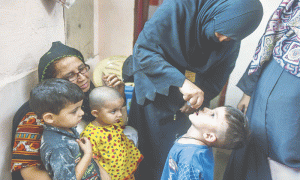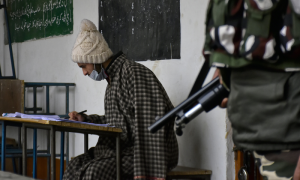LONDON: A recent study has provided valuable insights into the impact of COVID-19 on children, revealing that they are notably less likely to develop long-lasting symptoms, commonly referred to as “Long COVID,” compared to adults who may experience months of health difficulties after contracting the virus.
The study, published in Jama Pediatrics, sought to address concerns about the well-being of children in the event they developed Long COVID. The findings have brought relief, as it appears that not all children are at significant risk of experiencing prolonged COVID-19 symptoms.
Researchers analyzed data from 1,026 children, with an average age of 10.5 years, and advised parents to monitor symptoms every two weeks for a period of 76 weeks. Children who exhibited specific criteria, including a positive PCR test for COVID-19, the onset of new symptoms three months after a positive PCR test, and symptoms persisting for at least eight weeks after onset, were classified as having Long COVID. Symptoms that resolved after four weeks without recurrence were considered resolved.
Common symptoms experienced by children after COVID-19 infection included a sore throat (68%), stuffy nose (62%), headache (52%), cough (42%), fever (42%), and fatigue (35%). Encouragingly, the research showed that these symptoms typically improved within 10 weeks following a positive PCR test.
The study’s most striking finding was that only one child met the World Health Organization’s criteria for Long COVID, which stipulates that symptoms must persist for two months after the initial infection.
Dr. William Schaffner, an infectious disease specialist and professor of medicine at the Vanderbilt University School of Medicine, emphasized that the symptoms observed in children were relatively minor compared to the wide range of symptoms associated with Long COVID in adults, which can include cognitive impairment (“brain fog”), persistent aches and pains, and significant social dysfunction.
Long COVID-19 Rare in Children
Infectious disease expert Dr. Amesh A. Adalja echoed the findings, noting that it has been evident for some time that Long COVID is a rare occurrence in children. He reassured parents that this is not a major concern in the pediatric population.
Despite these positive findings, medical experts caution against complacency in the face of COVID-19. Dr. Schaffner stressed the importance of vaccinating children with the updated COVID-19 vaccines, highlighting that vaccination not only prevents severe COVID-19 but also contributes to reducing the risk of Long COVID.
He concluded, “I wouldn’t allow this one study all by itself to discourage you from vaccinating your children.”
Dr. Adalja advised parents to remain vigilant and monitor their children’s symptoms following COVID-19 recovery, especially if their child happens to contract the virus. He suggested that if a child experiences symptoms three months after recovery, parents can consider making an appointment with a Long COVID clinic, although this is expected to be an uncommon occurrence.






















